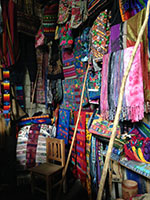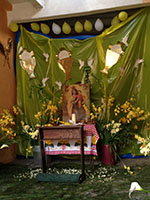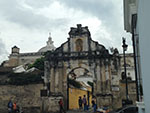![]()
Name: Heather Dubois
E-mail: dubois.10@nd.edu
Location of Study: Antigüeña, Spain
Program of Study: Antigüeña Spanish Academy
Sponsors:
A brief personal bio: After growing up in Louisiana, I studied English and Political Science there as an undergraduate. Since then, I have also lived in California, England, Southeast Asia and New York City, working in non-profits and getting masters degrees in Conflict Resolution and Systematic Theology. Now in South Bend, I am pursuing a PhD in Peace Studies and Theology. I am researching how our understandings of God affect our experiences of alienation and suffering, and how these in turn affect our capacities for healing and for violence.
Why this summer language abroad opportunity is important to me: Summer language study will impact my intellectual development and academic trajectory by enabling me: 1) to read primary sources to enrich my research in Latin American liberation and pastoral theologies, 2) to pursue field research in Central America related to peacebuilding, trauma healing and Christian interpretations of suffering, 3) to potentially engage in future research among Spanish-speaking U.S. Catholics, 4) to increase my capacity as a board member (since 2010) of an NGO named ALAS: Mesoamerica Peace Movement, and 5) to satisfy my third and last language requirement in a timely fashion according to my degree requirements. Now is a crucial time in my doctoral studies: if I am able to acquire language proficiency, a broader set of current and future possibilities will be opened to me. Without supported immersion study, I will have to narrow the scope of my research to more theoretical and domestic sources. My research interests and my dual degree program (in Peace Studies and Theology) direct me to the intersections of theory and practice. Learning to speak Spanish will enable me to follow this orientation into new theological, cultural, political, economic and geographic territories.
What I hope to achieve as a result of this summer study abroad experience: Building on the opportunity afforded by SLA to be in Central America, I will participate in a peacebuilding training in La Libertad, El Salvador this summer. I hope to absorb the majority of this training without translation assistance and to build relationships with the people I will meet both in the training and the surrounding community. When I return to Notre Dame, I begin a year of independent research, also known as the ‘exam year.’ Because of this grant, I plan to include Spanish texts to enrich the scope of my exam research questions. Third, I look forward to having conversations with my Spanish-speaking friends and colleagues living and passing through South Bend, thus broadening my professional and social networks. Finally, through this grant, I hope to achieve proficiency in salsa and merengue.
My specific learning goals for language and intercultural learning this summer:
- By the end of the summer, I will be able to read a Spanish language newspaper with ease and an academic article with dictionary support.
- By the end of the summer, I will be able to communicate in Spanish with native speakers about topics related to peace and conflict practice and scholarship.
- By the end of the summer, I will have the foundational knowledge to propel independent language maintenance and enrichment in years to come, as well as the confidence to pursue texts and conversation in Spanish beyond my level of mastery.
My plan for maximizing my international language learning experience: As I mentioned, I already have many professional and social relationships with Spanish speakers. One friend, for instance, has decided we will be “Spanish only” friends when I return. This will help me to maintain and increase my Spanish listening and speaking proficiency, while my exam year reading will support and challenge my reading proficiency. ![]()
Reflective Journal Entry 1:
Reflective Journal Entry 2:
Reflective Journal Entry 3: Many language schools in Guatemala offer exposure visits and activities so that students can learn about the local culture. My school’s most popular activity is a field trip to a a women’s textile cooperative in a nearby community called San Antonio. It is famous for the intricate and beautiful weaving done by the Mayan women of the community. It was noted many times that all of the weaving is done by hand, and this distinguishes it from many of the machine-made products sold by vendors walking through the central park of Antigua. As the leader of the group explained, this weaving is very important because it is deeply connected to the remembrance and transmission, and thus the preservation, of Mayan history and cultural knowledge. My Spanish teacher taught me this in one of my first lessons, as she drew a huipil, a traditional Mayan blouse. The one that she drew included many children, among significant animals, plants and other symbols. These, she said, represent the children of the women wearing the blouse. The children with plants growing from their heads have died; the plants indicate that they have returned to the soil to nourish the corn and the people. When a Mayan woman is near her death, said my teacher, she makes another blouse, one that shows the good and the bad of her life. It serves as a form of recollection and preparation for meeting her end. Mayan men, said my teacher, do not have an equivalent. In the San Antonio cooperative, the women showed us how they weave by hand, and also how to make tortillas and grind coffee. The afternoon ended with a meal of these tortillas, coffee and one of the dishes usually made for big events – pepian, a spicy red sauce over rice often paired with chicken. Rivaling these tasty things for the most vivid part of the day was the enactment of a Mayan wedding. Several volunteers from the audience were dressed in traditional attire and played the bride, groom, parents and in-laws. We learned about the huge amount of weaving that a young woman does to prepare for her gifts to the women in her family that are a part of a new marriage. We watched as the group danced – pulling more people from the audience, of course. And notably, at the end, we saw one of our classmates equipped with the typical burdens and blessings of a young wife: a baby strapped to the back and a heavy clay water-filled vase on top of the head, which is balanced with one hand while the other holds the small hand of a toddler. An awe-inspiring and intimidating posture, by the look on my classmate’s face. Reflective Journal Entry 4: After almost seven weeks in Antigua, it was time for me to test my Spanish skills in a new land – El Salvador. In my experience, this country holds a special place in the American Catholic imagination. It is invoked in so many conversations related not only to liberation theology, but also to “peace and justice” broadly conceived. It is a destination for many students from Notre Dame, for example. I am in El Salvador for an eight day training with the Mesoamerica Peace Movement, an organization founded and directed by Jose Chencho Alas. Chencho was trained as a priest and liberation theologian, and he has worked with the people of Central America, especially the peasants, for over forty years. While we have learned about the history of El Salvador, the origins of liberation theology, the legacy of Oscar Romero and Appreciative Inquiry Methodology, among many other things, the main theme of the training is earth and ecology. We have been spending most afternoons learning about and working with related projects, such as sea turtle conservation and tree planting. Primarily, we have helped to create a community garden, where vegetables will be grown to supplement the lunches served to the children at school. Because I have known Chencho for seven years and have been on the organization’s board of directors for four years, I have heard so much about these projects. And yet, this is the first time that I have seen them and met the Salvadorians who run them in person. It is a beautiful thing. In terms of language learning, traveling from Guatemala to El Salvador was an abrupt shift (though the bus journey took almost seven hours!). Everyone told me that the accent would be different, and I can hear that is true. More potent for me, I think, is the pace. Antigua has so many language schools, many people in the city automatically speak more slowly when they see a white-faced person. The friends of my friend and host do not have this habit. So I quickly found myself lost, confused and a bit lonely (a very typical state in language immersion, I know), even as everyone praised how much I have learned in only 6.5 weeks of classes. This was my second day in El Salvador; by the third day, however, the situation had changed yet again. The Canadians, the other workshop participants, arrived and suddenly my Spanish level appeared higher – and useful! As inadequate as I am for the role, I have served as a translator as we work with community members and live daily life – getting more coffee, figuring out how to arrange the garden rows, etc, etc. I feel simultaneously humbled and blessed here, in this place at this time with these people. Reflective Journal Entry 5: So I drank some of the wrong water. The result was three days of – well, not confinement but – proximity to a bathroom, let’s just say. At first, of course, I was just grumpy and feeling like an idiot for making such an obvious mistake. But then, the salience of this experience during a training on “earth and ecology” dawned on me. I was having stomach problems after doing the most normal thing that people do everyday all over the world – drinking water. Again, I know I’m not supposed to drink the tap water here – only “agua pura,” purchased, bottled water. My Guatemalan friend reminded me on arrival – “not even to brush your teeth.” It was the same when I traveled years ago in Southeast Asia. I remember a conversation with a mission priest who has lived and worked in Thailand for decades. “Shouldn’t I just suffer through the initial discomfort and get used to the water and food here?” I asked. I thought it was just a matter of being accustomed, a willingness to adapt. No, he replied patiently, we should work so that no one has to drink and eat unhealthy food and water. Once I started thinking along these lines, I recalled the stories that my Spanish teachers in Antigua shared, the ones about chronic stomach problems – theirs, their friends’, their families.’ Many are unable to drink coffee or eat spicy food. “Lots of people here have cancer.” Once again, I was confronted with my privilege. I had a few days of discomfort – only a few, thanks to some targeted antibiotics from the travel clinic! – but also the security that I had just made a mistake – that going forward I would have clean, healthy water to drink. I’m now back in Guatemala, taking Spanish classes in one of over a dozen Mayan towns on the shores of Lake Atitlan. This giant lake (the deepest in Central America), surrounded by volcanoes, is a national treasure. It is known as one of the most beautiful lakes in the world. And it is dying, from pollution. Again, I am contemplating water in a visceral way. It’s hot, and everyday the glistening blue tempts me. Yet, I don’t swim because I’m not sure about the water; I’ve heard lots of stories of people getting sick from swimming. A friend is staying in another village – tiny, with very few buildings or people – and I swam there once (it was great). But many of the “local foreigners” in my town say don’t swim here, “unless you are Mayan.” Again, the water discrepancies. Daily I see the indigenous inhabitants here bathing and washing clothes. And me? I’m planning to travel back to my friend’s side of the lake tomorrow, to swim once more before my time here is over. (For more information on the health of Lake Atitlan, seehttp://www.csmonitor.com/World/Americas/2014/0629/Can-Guatemala-revive-Lake-Atitlan-before-it-s-choked-by-trash) Reflective Journal Entry 6: I’ve spent lots of time with people for whom English is a second language over the years. I’ve also helped a friend through her transition from super-basic to full-on conversational. It’s incredible to watch a person’s personality emerge through the acquisition of vocabulary and confidence. I’ve thought a lot about these experiences this summer, as I have myself felt trapped and isolated within myself, unable to express myself or fully participate in a conversation. Especially the jokes and the banter. I remember my friend telling me how heartbreaking it had been for her to feel moved, but unable, to share something she knew would make me laugh. Of course, the other side of this is the joy, accomplishment, and even communion felt when verbal communication happens (in addition to the smiles that are the bread and butter of intercultural exchange). All of this adds to the respect that I have for the Spanish teachers that I have met in Guatemala. I had a long listen with one of my teachers last week about her profession. It is not “simple work” as many people think, she said. Given that Guatemala has become a hub for language schools, the demand for teachers in the “high” season can exceed the numbers that have been specially trained. This means that some teachers know little about grammar or how to teach a language, though they are often great conversationalists (and this can be fine depending on a student’s needs and language level). My teacher explained that she, however, had worked to receive extensive training. Thus, she is dispirited when people in her community imply that “anyone” can do her job. Having had a variety of teachers – with a variety of strengths and weaknesses – this complaint resonated with me as a valid and difficult one. What responsibility, I thought, do we have as students and tourists in shaping this culture in and around Spanish schools? Should I, for instance, have sought to attend one of the more expensive language schools in order to support better pay for Spanish teachers? I actually thought that I was doing that when I chose a teachers’ cooperative in Lake Atitlan. But I learned later that the money saved through teacher-managers is put into community development projects. That’s obviously a great thing – and I recommend San Pedro Cooperative School, by the way – but it doesn’t address the challenges of respect for the teachers and financial support for those who do, or would, seek specialized training. I learned a lot from all of my teachers: some shared historical stories of Guatemalan culture and politics, others communal and personal aspects of life in Guatemala today. Some gave me the grammatical structures that I needed, one took an interest and eventually pride in my pronunciation. All of them frustrated me at some point and made me laugh and feel immensely grateful at other points. (Spending 4-5 hours face-to-face with one person every day, 5 days a week is intense!) As I come to the end of my time taking classes, I think a lot about how to maintain and expand what I have learned. I hope this will be a concern of mine for the rest of my life. But first, I promised Andrea, Laura, Rosa and Aurora that I would pass my language proficiency exam when I return to South Bend. ![]()
Reflection on my language learning and intercultural gains:
I admit, I wondered if I might be a bit old (35yrs next month) for extensive language learning. I knew that I’d be able to pick up enough reading skills, given the intensive courses I’d already managed the two summers prior. But I was nervous about the speaking and listening parts. Suffice it to say, I was pleasantly surprised. During the last few weeks, I even started having daydreams about regular trips abroad to practice and take more classes, not only in Spanish but perhaps renewing my French one day as well. As for intercultural gains, I was struck by the distinct impression that I was now a part of the whole of the Americas, able to think and imagine in terms of my continent instead of mainly my country.
Reflection on my summer language abroad experience overall:
It’s hard to put the response to this prompt in paragraphs, because it was such a multi-faceted experience. There were the obvious pleasures of being in a beautiful place, trying new foods, meeting interesting people; the obvious feelings of accomplishment associated with communicating in a new language, navigating a new country; the obvious psycho-spiritual challenges of culture shock, homesickness and then reluctance to return home.
Perhaps I can just say why I’m really grateful: not only did I receive the gifts above, I also received them at a time in which they made an important impact. I’d lived abroad before, but had forgotten that I know how to do that. I’d enjoyed speaking another language before, but had begun to doubt my capacity for it. I’d experienced two great years of coursework, but was starting to domesticate or narrow the scope of research trajectories. This trip gave me an excellent shove in the direction of more – doing, trying, expecting more.
How I plan to use my language and intercultural competences in the future:
I just finished writing up a bibliography for my third year exams, and it included essays in Spanish. This could not have happened before this summer. Secondly, I have already introduced my fledgling Spanish to my fluent friends at Notre Dame, receiving their support and encouragement. I’ve made a contact with the campus salsa club and plan to visit the Spanish department to learn about events and other opportunities for practice. Third, I’m going to be a much more frequent visitor to Taqueria Chicago and South Bend’s pupuseria. Fourth, because I’ve gained a stronger understanding of migration within North and Central America, I will be more closely following related news events and opportunities for civic and campus activism.



